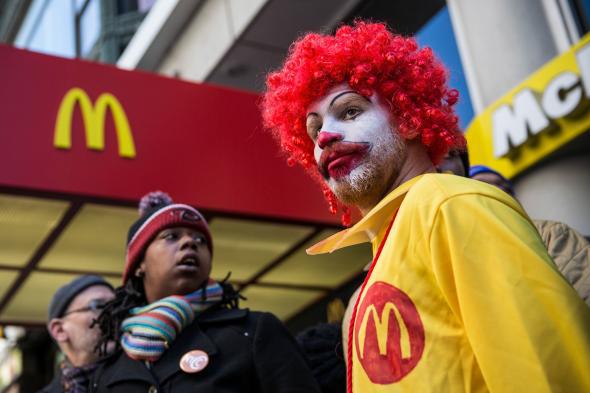On Tuesday afternoon, the general counsel of the National Labor Relations Board said something that could radically change the worker-employer relationship for major restaurant companies. McDonald’s, the board’s general counsel determined, could be held as a “joint employer” in certain complaints over workers’ rights at its franchises.
In the past, McDonald’s has escaped liability for management practices at its franchises by saying that the franchisee, and not its corporation, determines wages and working conditions in those restaurants. In the U.S., roughly 90 percent of McDonald’s 14,000-some restaurants are franchise operations. (Globally, just over 80 percent of McDonald’s stores are run as franchises, and in 2013 they yielded about $9.2 billion in revenue.) Heather Smedstad, senior vice president of human resources for McDonald’s USA, told the Associated Press that calling McDonald’s a joint employer with franchisees was a “radical departure” and “should be a concern to businessmen and -women across the country.”
Fast-food giants such as Burger King and Yum! Brands (the owner of Taco Bell, Pizza Hut, and KFC) have used similar lines of reasoning in rejecting the joint-employer label. The idea is that business practices and labor practices are apples and oranges: Just because McDonald’s is concerned with its overall brand and bottom line doesn’t mean it should be responsible for the management standards—from hiring practices to scheduled break times—of individual franchisees across the country. “McDonald’s, like any company, has the right to establish its standards,” says Lawrence Lorber, senior council at Seyfarth Shaw and former deputy assistant secretary of labor. The NLRB decision, Lorber says, “seems to be a fairly significant stretch, because what it’s saying is that business standards make someone a joint employer when there’s no other employer relationship.”
Labor organizers argue that because McDonald’s exerts so much control over the specifics of how its franchised restaurants are run—menu, uniforms, décor, and so on—it should be held accountable for workers’ rights as well. The argument, essentially, is that McDonald’s is currently getting the best of both worlds: It has ample power to control the parts of the business it cares about at franchises, while offloading liability for labor and wage violations onto its franchisees.
“If you think about how carefully McDonald’s monitors every detail of how the franchises function in order to maintain their brand consistency, it would be disingenuous to say they have no influence over workplace conditions,” says Rick Hurd, professor of industrial and labor relations at the Cornell University ILR School.
If upheld, the NLRB determination would apply only within the U.S. The rights of workers at franchises in other countries are governed according to rules and regulations there. “Generally, I think you could say that U.S. labor law protections are some of the weakest in the world,” says Wilma Liebman, who served as chairman of the NLRB from 2009 to 2011.
Since November 2012, 181 cases involving McDonald’s have been filed with the NLRB. Of those, the general counsel found 43 to have merit, while 64 are still pending investigation, the agency said in a statement.
While the NLRB has often investigated cases involving questions of joint employers, Hurd said it has danced around the issue of how this status might apply to franchises. “When the National Labor Relations Act was passed in 1935, the standard employer was large manufacturers with lots of employees,” he explains. “We didn’t have these kind of widespread franchise operations back in 1935. The law doesn’t explicitly deal with them, and it’s something that the NLRB has shied away from.”
Liebman echoes this point. “The law is in some ways anachronistic for the way business is done today,” she says, inadvertently giving companies cover to “insulate themselves from labor obligations.”
In the short term, little will come of the general counsel’s statement, which simply allows complaints alleging that McDonald’s is a joint employer with franchisees to proceed. “I know there’s been some talk about suddenly having hundreds of thousands of fast-food workers join unions, but that’s not going to happen, at least not overnight,” Hurd says. But the determination will no doubt add fuel to workers’-rights campaigns like those against McDonald’s and Wendy’s. And it means that more companies are vulnerable to those same kinds of campaigns—whether it’s Dunkin’ Donuts, Buffalo Wild Wings, Domino’s, or so many other heavily franchised restaurants across the country.
